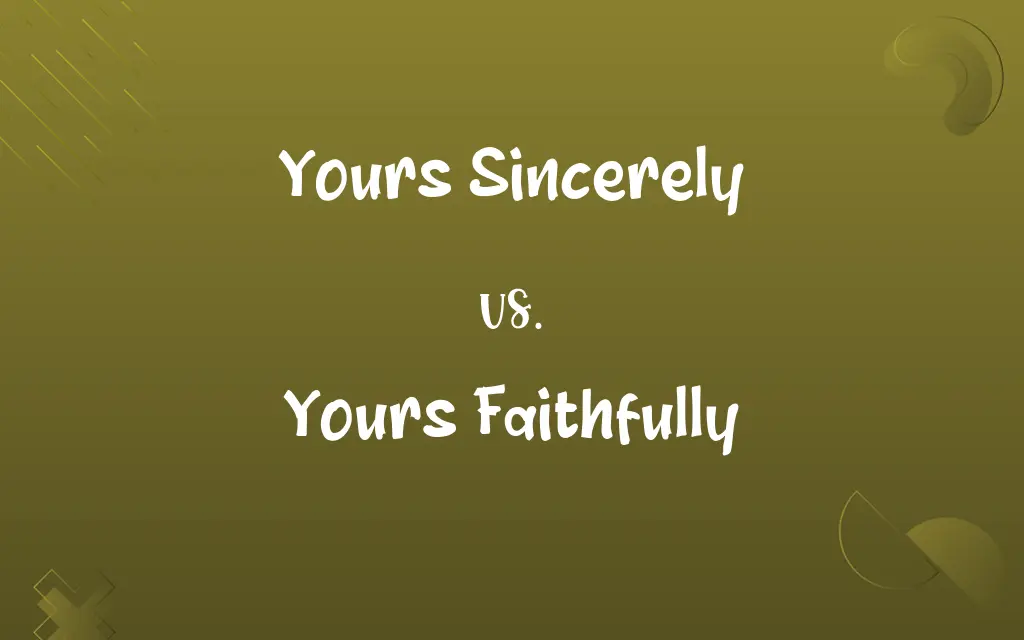Yours Sincerely vs. Yours Faithfully: Know the Difference

By Shumaila Saeed || Published on February 27, 2024
"Yours Sincerely" is used in formal letters when the recipient's name is known, while "Yours Faithfully" is used when the recipient's name is unknown.

Key Differences
"Yours Sincerely" and "Yours Faithfully" are both formal valedictions used in letter writing, but their usage depends on how the recipient is addressed. "Yours Sincerely" is used when the letter begins with the recipient's name, typically in letters where a prior relationship or familiarity exists. For example, a letter starting with "Dear Mr. Smith" ends with "Yours Sincerely."
Shumaila Saeed
Feb 27, 2024
"Yours Faithfully," in contrast, is used when the recipient's name is not known and the letter starts with a general salutation like "Dear Sir/Madam." This usage is appropriate in formal letters where there is no personal connection or prior acquaintance with the recipient. It conveys a sense of respect and formality in the absence of a direct relationship.
Shumaila Saeed
Feb 27, 2024
The phrase "Yours Sincerely" is commonly used in American and British English, especially in professional or business correspondence where the name of the recipient is known. This closing signifies a level of professionalism and a personal touch, acknowledging the named individual at the letter's beginning.
Shumaila Saeed
Feb 27, 2024
"Yours Faithfully," while less common in American English, remains a staple in British formal correspondence when addressing someone whose name is unknown. It signifies respect and adherence to formal letter-writing etiquette, particularly in situations like job applications or inquiries to companies.
Shumaila Saeed
Feb 27, 2024
Both phrases reflect the level of formality and the relationship between the sender and the recipient. "Yours Sincerely" is more personal and direct, while "Yours Faithfully" maintains formality and respect in situations where personal connection or familiarity is absent.
Shumaila Saeed
Feb 27, 2024
ADVERTISEMENT
Comparison Chart
Usage Based on Recipient's Name
Used when name is known
Used when name is unknown
Shumaila Saeed
Feb 27, 2024
Type of Correspondence
Personal, professional letters
Formal, impersonal letters
Shumaila Saeed
Feb 27, 2024
Implied Relationship
Some familiarity or prior contact
No personal connection
Shumaila Saeed
Feb 27, 2024
ADVERTISEMENT
Yours Sincerely and Yours Faithfully Definitions
Yours Sincerely
Conveys respect in a direct and personal manner.
Yours Sincerely, Emily.
Shumaila Saeed
Jan 21, 2024
Yours Faithfully
Conveys respect in formal letters without personal connection.
Yours Faithfully, Jane.
Shumaila Saeed
Jan 21, 2024
Yours Sincerely
A standard closing in many formal letters.
Yours Sincerely, Anna.
Shumaila Saeed
Jan 21, 2024
Yours Faithfully
A standard closing in formal British correspondence.
Yours Faithfully, Emily.
Shumaila Saeed
Jan 21, 2024
Yours Sincerely
Common in business letters to known recipients.
Yours Sincerely, Michael.
Shumaila Saeed
Jan 21, 2024
ADVERTISEMENT
Yours Faithfully
Suitable for letters starting with "Dear Sir/Madam."
Yours Faithfully, Michael.
Shumaila Saeed
Jan 21, 2024
Yours Sincerely
Used to conclude a letter when the recipient's name is known.
Yours Sincerely, John Doe.
Shumaila Saeed
Jan 21, 2024
Yours Faithfully
Used when the recipient's name is unknown in a letter.
Yours Faithfully, John Doe.
Shumaila Saeed
Jan 21, 2024
Yours Sincerely
Implies a degree of familiarity in professional correspondence.
Yours Sincerely, Jane.
Shumaila Saeed
Jan 21, 2024
Yours Faithfully
Common in job applications and formal inquiries.
Yours Faithfully, Anna.
Shumaila Saeed
Jan 21, 2024
Repeatedly Asked Queries
When should I use "Yours Sincerely"?
Use it when you know the recipient's name.
Shumaila Saeed
Feb 27, 2024
Is "Yours Faithfully" outdated?
It's less common, especially in American English, but still used in formal British correspondence.
Shumaila Saeed
Feb 27, 2024
Can "Yours Sincerely" be used in emails?
Yes, it's appropriate for formal emails when the recipient is known.
Shumaila Saeed
Feb 27, 2024
Is "Yours Sincerely" too formal for casual letters?
It can be formal; consider a more casual closing for informal letters.
Shumaila Saeed
Feb 27, 2024
Can "Yours Faithfully" be used in personal letters?
It's more suited for formal, not personal, letters.
Shumaila Saeed
Feb 27, 2024
Should I always use "Yours Faithfully" in formal queries?
Use it when addressing the letter to an unknown person.
Shumaila Saeed
Feb 27, 2024
Should "Yours Faithfully" be used in business letters?
Yes, if the recipient's name is unknown.
Shumaila Saeed
Feb 27, 2024
Can I use "Yours Sincerely" in a job application?
Yes, if addressing a known individual in the company.
Shumaila Saeed
Feb 27, 2024
Can "Yours Sincerely" be used in cover letters?
Yes, if addressing a specific person.
Shumaila Saeed
Feb 27, 2024
Does "Yours Sincerely" suit thank-you letters?
Yes, it's appropriate for formal thank-you notes.
Shumaila Saeed
Feb 27, 2024
Can "Yours Faithfully" be seen as overly formal?
In some contexts, especially in casual American English.
Shumaila Saeed
Feb 27, 2024
Is "Yours Faithfully" used in email signatures?
Less common in emails, more in formal physical letters.
Shumaila Saeed
Feb 27, 2024
Can I use "Yours Faithfully" in a letter to a known person?
It's more appropriate to use "Yours Sincerely" in that case.
Shumaila Saeed
Feb 27, 2024
Does "Yours Sincerely" imply a personal relationship?
Not necessarily, but it suggests some familiarity.
Shumaila Saeed
Feb 27, 2024
Is "Yours Faithfully" only for British English?
It's more common in British English but understood globally.
Shumaila Saeed
Feb 27, 2024
Should "Yours Faithfully" be capitalized?
Yes, both words should be capitalized.
Shumaila Saeed
Feb 27, 2024
Is "Yours Faithfully" appropriate for complaint letters?
Yes, if the recipient's name is unknown.
Shumaila Saeed
Feb 27, 2024
Can "Yours Sincerely" be abbreviated?
It's not standard to abbreviate it in formal letters.
Shumaila Saeed
Feb 27, 2024
Is "Yours Sincerely" common in American business letters?
Yes, it's a standard closing.
Shumaila Saeed
Feb 27, 2024
Do "Yours Sincerely" and "Yours Faithfully" have similar meanings?
They are similar but used in different contexts based on the recipient's known status.
Shumaila Saeed
Feb 27, 2024
Share this page
Link for your blog / website
HTML
Link to share via messenger
About Author
Written by
Shumaila SaeedShumaila Saeed, an expert content creator with 6 years of experience, specializes in distilling complex topics into easily digestible comparisons, shining a light on the nuances that both inform and educate readers with clarity and accuracy.








































































